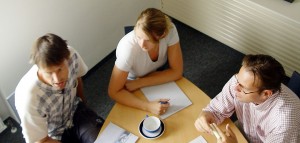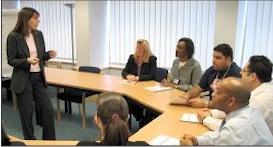Perhaps you know some people who say there are never any really effective meetings. And it’s true that no matter how effective you might hope the meetings you organise are, there are often others present who think they could have done more important things with the time.
 The problem is that, in this busy world, everyone around the table has a lot of things they personally need to do – and those things aren’t necessarily what you called the meeting for!
The problem is that, in this busy world, everyone around the table has a lot of things they personally need to do – and those things aren’t necessarily what you called the meeting for!
So when you plan meetings you really do have an obligation to everyone present to make sure they are effective meetings which promote teambuilding and project success, rather than a waste of everyone’s time.
Meetings can actually be very effective, with the right meeting planning. There are a number of things you can do as a leader to ensure you hold effective meetings so here are four tips to make your meetings more effective.
First, effective meetings have a clearly understood and communicated purpose. There is nothing that makes a meeting more ineffective than when there is an unclear objective. Lack of clarity in your meeting ‘s purpose can even lead to meeting attendees working at cross-purposes. When you define the meeting objective clearly – and communicate it to attendees before the meeting begins – you will find the right people not only attend your meeting, but they come well prepared and participate fully. This is one of the most powerful ways to ensure your meetings are effective meetings.
Second, make sure the attendees are the right people who need to be there. Don’t invite others who aren’t involved in the project and don’t neglect to include everyone who is. If the right people are at your meeting, all the information you need will be available, decisions will be made more quickly, time won’t be wasted bringing people up to speed on issues or outcomes and teambuilding will occur by default as people begin to feel involved in the things that matter.
Third, make sure your meeting lasts as long as needed to achieve your outcomes – but no longer. That doesn’t mean that sharing a cup of coffee or even a meal before or after your meeting is inefficient or a waste of time. In fact it can be a great way to build team spirit – better even than many other team building exercises. And if teambuilding is one of your objectives in organising the meeting you might even consider it an essential part of your meeting agenda. However, if your meeting has a more focused purpose that is achieved in 20 minutes, don’t be afraid to conclude the meeting just because you asked people to set aside an hour for it. You will find everyone will be delighted to move on to work on their other priorities.
And finally, if your meeting is critical, such as one for strategic business planning, a critical incident review or even just one where poor group dynamics is an issue, consider using a professional facilitator. An external group facilitator will mean that you are able to fully participate in the discussions, rather than having to focus on the meeting process which is imperative in such critical situations. Careful group facilitation can be the difference between achieving your meeting’s purpose or not – and after all, that is at the core of what effective meetings are all about!
If you are considering using a meeting facilitator download our Facilitation Fact Sheet for details about:
- Why to use a professional facilitator
- How to make the most effective use of independent workshop facilitation
- When an external meeting facilitator can add most value to your meetings.
So, there are four simple yet powerful things that will make your meetings are effective meetings which promote good team building. Apply them now and you’ll become known as someone who always runs the most effective meetings.






